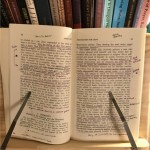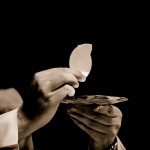I have been engaged in a new liturgy recently. This liturgy has changed me profoundly.
I arrive a few minutes early to each gathering and sit in a room amongst like-minded people. We definitely do not look the same, each coming from different walks of life, but we are all committed to the same principles, traditions, and concepts.
The one presiding over the meeting will call the gathering to order, read some opening acclamations about the purpose of our time together, make some announcements, and then invite others to participate.
At this point someone new begins to speak. Normally this individual is going through something difficult or has a strong compulsion to share and ask for guidance or advice. There is no judgment here—on several occasions I have been the one who felt so compelled to speak and every time I found understanding and others who said, “Me too.”
Once the theme or trajectory of the meeting has been firmly established, those gathered also participate by offering up their own stories and experiences in order to help the one in need. After speaking, there is usually a chorus of, “Glad you’re here” or “keep coming back.” The welcoming atmosphere can be a bit overwhelming.
The meeting concludes with the Lord’s Prayer which binds us together and sends us out to continue practicing that which we know to be true. The meeting ordo is simple: Gathering—Reading—Exhortation—Prayer—Dismissal. It is not unlike the Anglican liturgy in which I have been participating for almost 30 years. Nor is it the same.
Every time I speak during the gathering, I begin with, Hi, my name is Porter Taylor and I’m an alcoholic.
For the last 14 months, I have been attending meetings regularly. On March 9, 2016, I admitted to my wife and family that I am an alcoholic, that I was and am powerless over alcohol, and that my life had become unmanageable. (Taken from 12 Steps and 12 Traditions, Step 1.) That day, I began the life-long process of recovery from this disease.
As you can imagine, the process of recovery has not been easy. There have been difficult moments, days, and weeks – recovery is not for the faint of heart. But there has also been healing, joy, and triumph. The gift of rising strong. As the slogan says, the program works if you work it.
A lot of you might be thinking How can he be an alcoholic? If we are judging by the stereotype, you’re right. I rarely had more than two drinks, my children have never seen me even close to drunk, in 12 years my wife has only seen me drunk twice, I wasn’t in line at the liquor store when it opened, I never got the shakes, I wasn’t a “homeless bum” living under a bridge. I am a husband. I’m a father of three. I own a home, cars, and a business. I’m a PhD student. I’m a priest. From the outside looking in, I had it all together.
But on the inside was 30 years of pain and emotions never dealt with. Inside was a hugely sensitive person who thought feeling wasn’t normal. So for 30 years I did what I thought was normal: I repressed everything. Angry? Go for a run. Scared? Make a joke. Sad? Pour myself into work. Worried? Play with the boys, go on a date with Rebecca. The key was: ignore. And then, eventually, the key became to drink.
For me, alcohol was always a means to an end—in fact, it was never really about the alcohol. It was about numbing pain, trying to forget, trying to bring suppressed feelings to the forefront of my mind; it was about “deserving” a drink because I was happy, tired from a long day, or needed to take the edge off. Or maybe I had accomplished something positive, or needed the “liquid courage” to be around people. In short, alcohol became whatever I wanted it to be and it morphed into something different each time. Alcohol could help me feel or not feel, whichever I deemed necessary at the time. And for a while, it worked.
But that’s the issue: It wasn’t about what I drank, or even how much, but why I drank. As Glennon says, I would send my representative into the public arena so I could remain hidden and safe in my cocoon, away from tempestuous and unpleasant emotions. And that’s part of the point: one does not have to wait for total devastation to hit before admitting struggle, addiction, or bondage.
And so I admitted that I am an alcoholic.
I don’t share any of this with you to brag or to promote myself or the Fellowship, but to share with my friends (and some strangers!) what has been going on in my life. I don’t want to send my representative out into the world anymore.
For anyone who has ever felt overwhelmed with life, befuddled by the complexity of emotion(s), or uncontrollably resentful for things that have happened in the past; for those who seek to alter their attitudes, actions, or surroundings through alcohol or other chemicals; for those who feel as though there isn’t enough alcohol in the world to satisfy or quench or numb or help; for those who are dependent upon a substance but don’t know how to admit it; for those who are in positions of spiritual leadership and are too ashamed to admit their need…
For anyone like this, I want to say to you, “I know. Me too.”
There is another way of living. As someone told me in my first meeting, you never have to feel this way again if you don’t want to. If you are tired of sending your representative into life, tired of running, lying, or hiding, reach out. If you’re ready to embrace the hard, hopeful work of recovery, you can.
It is with extreme gratitude, humility, and joy that I can say to you: My name is Porter Taylor and I am an alcoholic.













